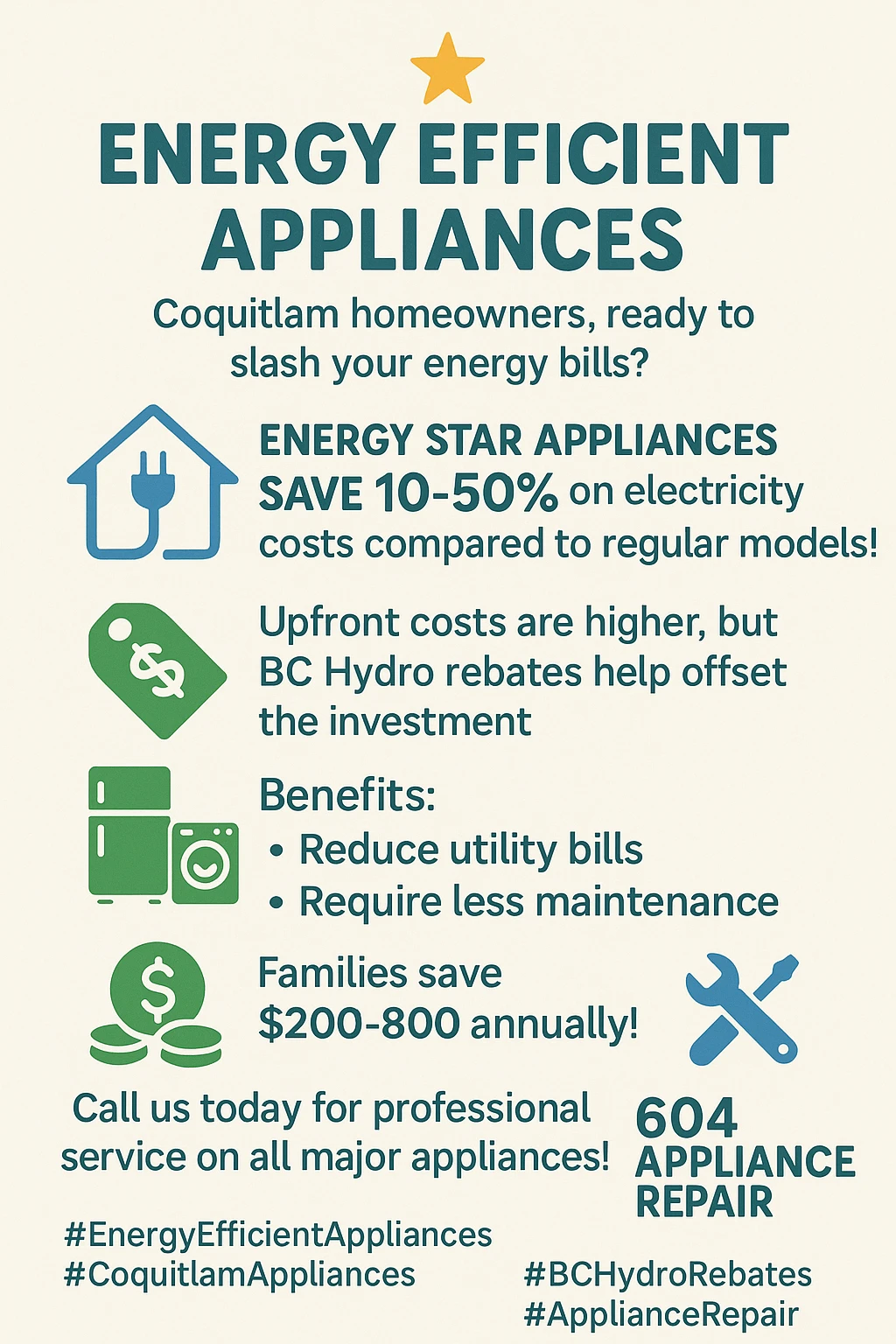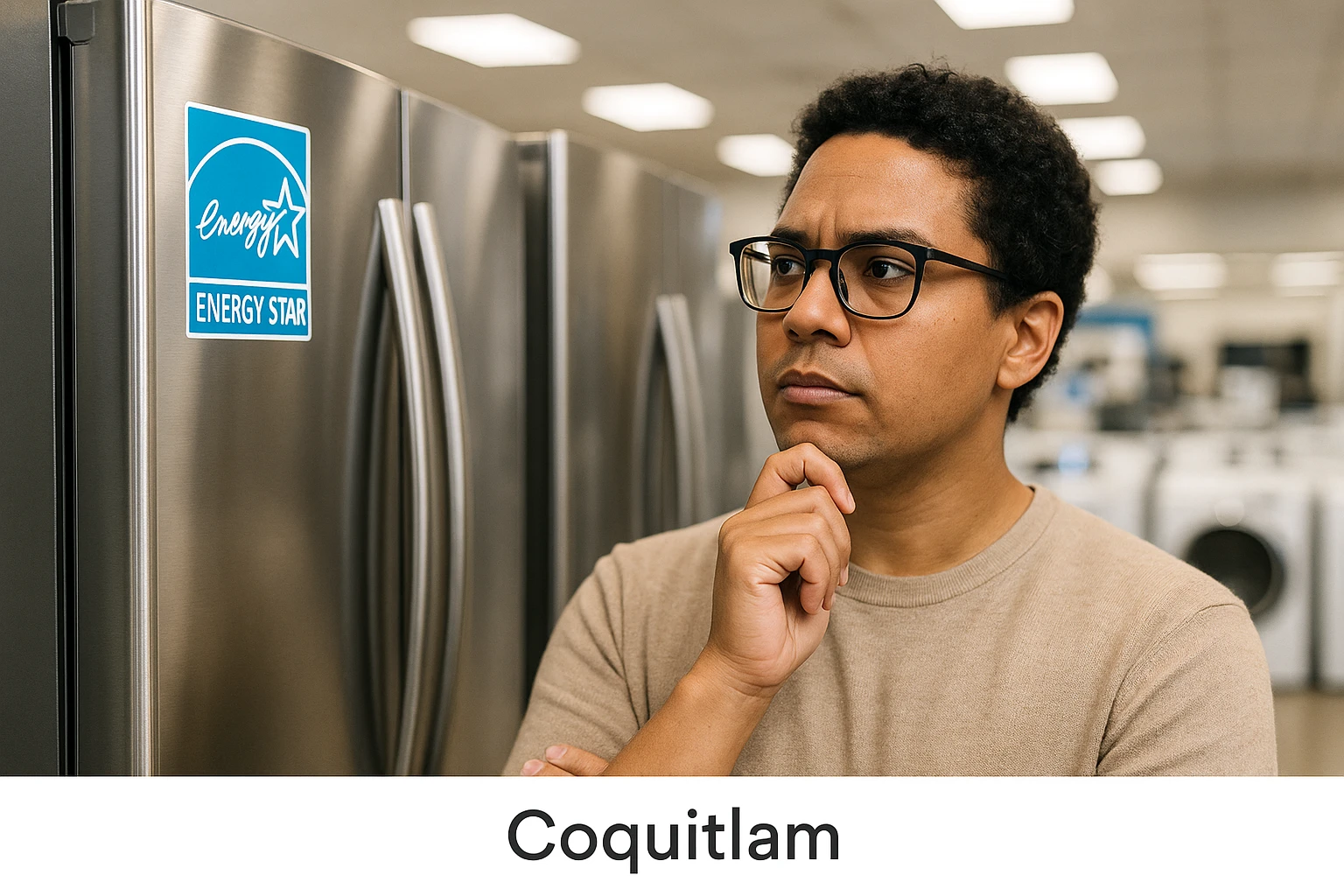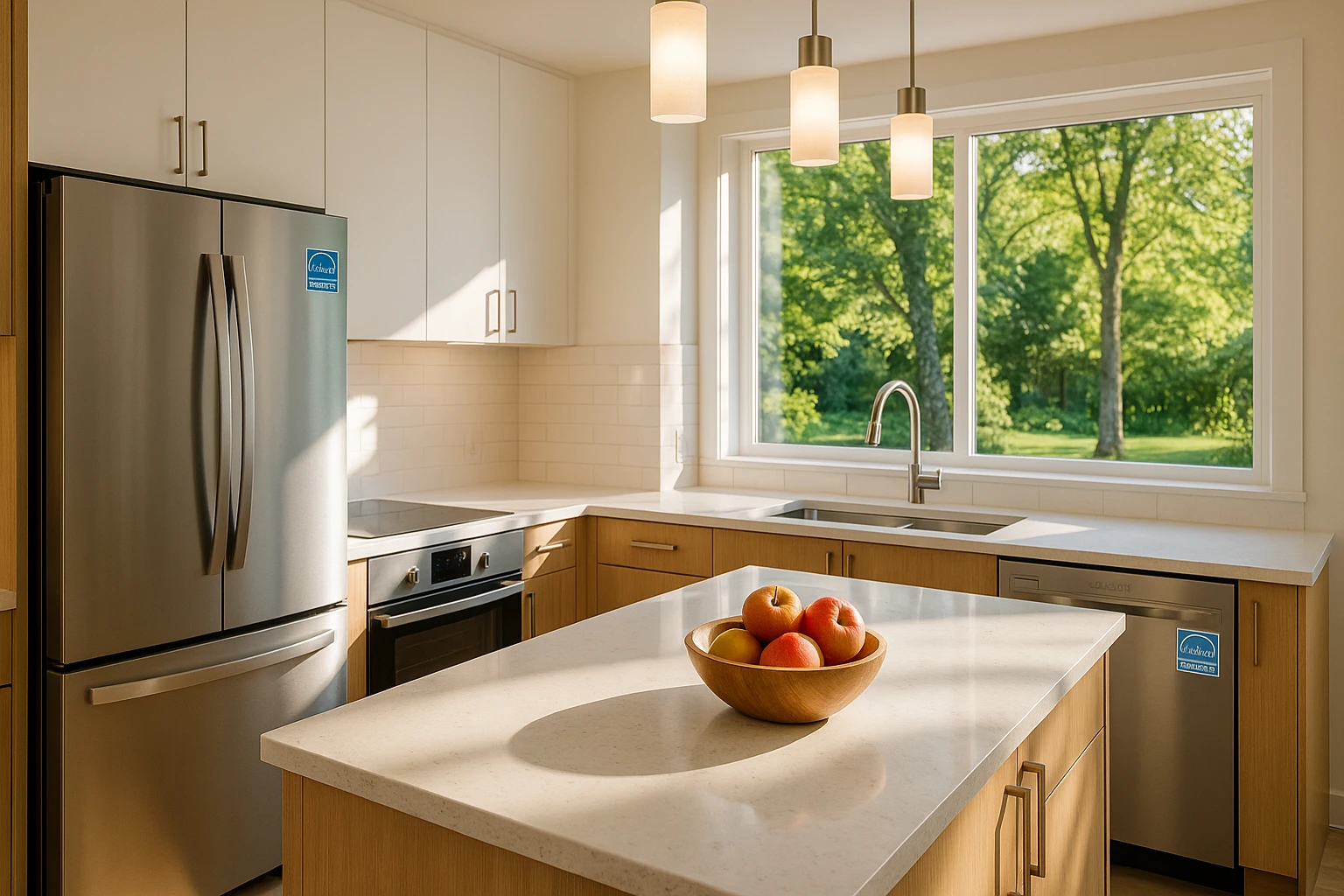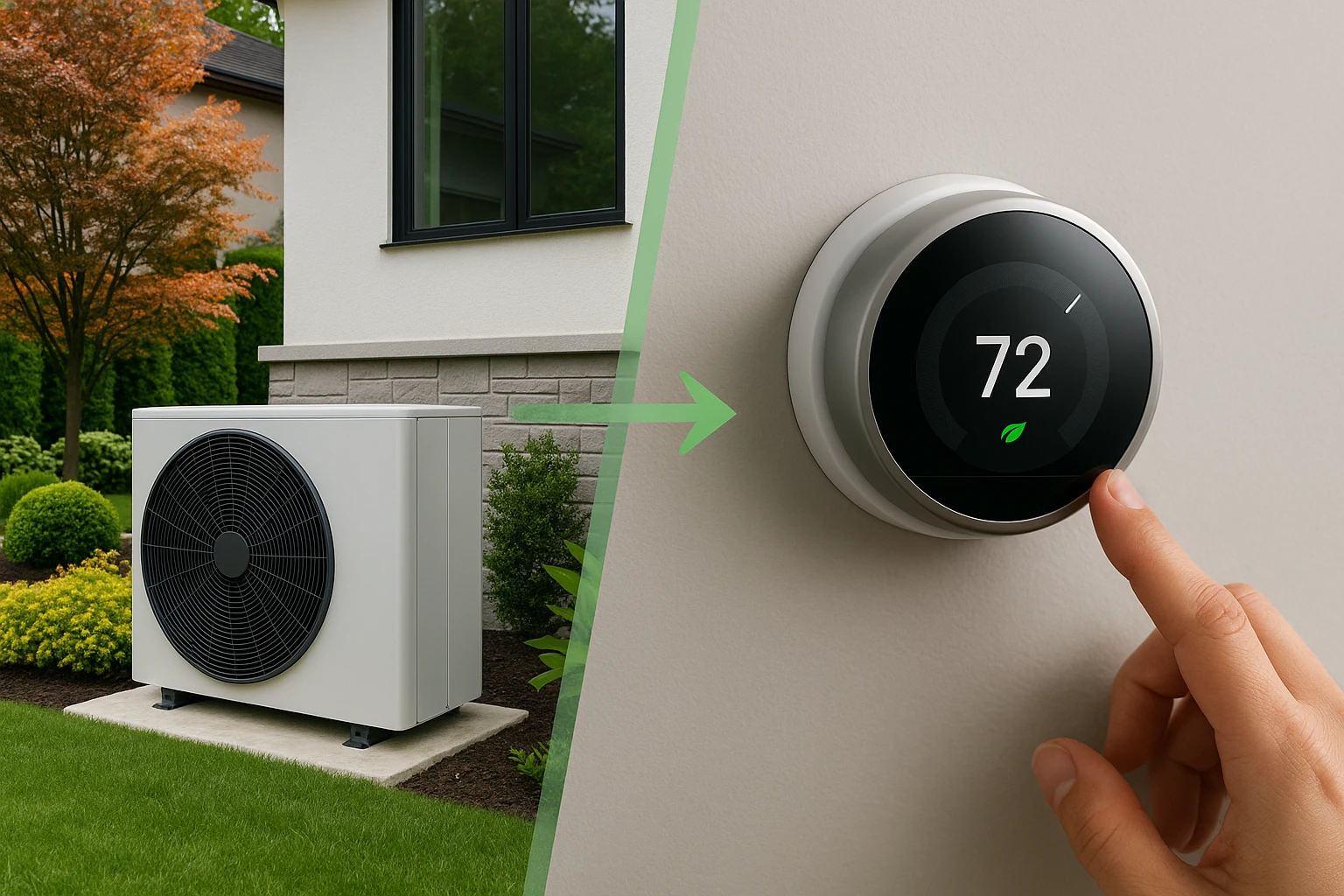Energy-Efficient Appliances vs Regular Models: A Coquitlam Homeowner’s Complete Cost-Benefit Analysis for 2024
Wondering if those shiny ENERGY STAR® appliances are actually worth the extra upfront cost for your Coquitlam home? Let’s dive into the real numbers and break down exactly what you’ll save (or spend) when choosing energy-efficient models over their regular counterparts.Picture this: you’re standing in an appliance showroom in Coquitlam, staring at two seemingly identical refrigerators. One has that little blue ENERGY STAR® label, costs $200 more, and promises to save you money on electricity bills. The other looks exactly the same but doesn’t have the fancy certification. Which one do you choose? If you’re like most homeowners, you’re probably doing some quick mental math right about now, wondering if that energy efficiency badge is worth your hard-earned cash. Here’s the thing – as someone who’s been deep in the home improvement game for years, I’ve seen countless Coquitlam homeowners wrestle with this exact decision. The energy-efficient appliance market has exploded, and honestly, it can feel overwhelming trying to figure out what’s actually beneficial versus what’s just marketing fluff. But here’s what I’ve learned: the math isn’t as complicated as appliance salespeople make it seem, and the results might surprise you.The reality is that buildings account for over 40% of Coquitlam’s community greenhouse gas emissions, which means your appliance choices have a bigger impact than you might think. Whether you’re upgrading your entire kitchen or just replacing that ancient washing machine, understanding the true cost-benefit analysis of energy-efficient appliances can save you thousands of dollars over the next decade – or help you avoid a costly mistake.
Key Outtakes:
- Energy-efficient appliances typically cost 10-50% more upfront but can save 10-25% on annual operating costs
- ENERGY STAR® refrigerators, washers, and dryers qualify for rebates up to $250 from FortisBC and BC Hydro
- Heat pumps are the most energy-efficient heating systems available in BC and provide both heating and cooling
- Payback periods for energy-efficient appliances range from 2-7 years depending on the appliance type and usage
- Smart thermostats and LED lighting upgrades offer the quickest return on investment for energy efficiency improvements

Understanding the True Cost of Appliance Ownership

When we talk about appliance costs, most people only think about that price tag in the store. But here’s where things get interesting – and where a lot of homeowners make expensive mistakes. The real cost of any appliance isn’t just what you pay upfront; it’s what you’ll spend over its entire lifespan. Think of it like buying a car – you wouldn’t just look at the sticker price and ignore gas mileage, right?Energy-efficient appliances flip this traditional thinking on its head. Sure, that ENERGY STAR® certified refrigerator might cost $1,200 instead of $1,000, but if it saves you $50 per year on electricity bills and lasts 15 years, you’re looking at $750 in savings over its lifetime. Suddenly, that extra $200 doesn’t seem so bad – in fact, you’re ahead by $550. This is what we call the total cost of ownership, and it’s the secret sauce that smart homeowners use to make appliance decisions.But here’s where it gets even more interesting for us Coquitlam folks. BC Hydro and FortisBC offer seasonal deals and rebates that can significantly reduce that upfront cost difference. From May to August, you can snag $50 off ENERGY STAR® air conditioners, $30 off air purifiers, and $10 off WaterSense® certified showerheads. These aren’t huge amounts individually, but when you’re upgrading multiple appliances, those savings add up faster than you’d think.The key is understanding that energy efficiency isn’t just about being environmentally conscious (though that’s awesome too) – it’s about being financially smart. Every month, your regular appliances are quietly draining extra money from your bank account through higher electricity bills. Energy-efficient models are like having a personal assistant who finds ways to cut your expenses without you even noticing.
Breaking Down Energy-Efficient Appliance Categories

Now that we’ve covered the financial fundamentals, let’s dive into the specific appliance categories where energy efficiency makes the biggest difference. Not all appliances are created equal when it comes to energy savings, and understanding which ones offer the best bang for your buck is crucial for making smart purchasing decisions.
Kitchen Appliances: The Heavy Hitters
Your kitchen is probably the biggest energy consumer in your home, so this is where energy-efficient upgrades can have the most dramatic impact. ENERGY STAR® certified refrigerators are the all-stars here – they’re required to be at least 15% more efficient than federal minimum standards. For a typical Coquitlam household, this translates to about $40-60 in annual savings. When you consider that a good refrigerator lasts 12-15 years, that’s $480-900 in your pocket over the appliance’s lifetime. Dishwashers are another category where efficiency really shines. Modern ENERGY STAR® dishwashers use advanced spray patterns and soil sensors to clean dishes with minimal water and energy. The water savings alone can be significant – we’re talking about using 3.5 gallons per cycle versus 6 gallons for older models. In Coquitlam, where water costs are steadily rising, this matters more than you might think.Here’s something cool about energy-efficient cooking appliances: induction cooktops transfer 85-90% of their heat directly to your food, compared to just 65-70% for regular electric cooktops. This means faster cooking times, lower electricity bills, and less heat in your kitchen during those warm Coquitlam summers. The only downside? You’ll need induction-compatible cookware, but honestly, it’s worth the investment for the precision and efficiency you get.
Laundry Room Champions
Your laundry room might be small, but it’s packed with energy-saving potential. ENERGY STAR® washing machines use about 25% less energy and 33% less water than regular models. For a family doing 8 loads per week (which is pretty typical), this can save you $40-70 annually. But here’s the kicker – these machines also have higher spin speeds that extract more water from your clothes, which means shorter dryer cycles and even more savings.Speaking of dryers, this is where things get really interesting. ENERGY STAR® dryers with a Combined Energy Factor (CEF) of 3.93 or higher qualify for $100 rebates from FortisBC. Models with CEF ratings of 4.4-5.6 get you $150, and the super-efficient ones (CEF 5.7+) come with $250 rebates. These aren’t just modest energy savers – they’re game-changers that can cut your laundry energy costs by 20-30%.The coolest part about modern efficient dryers is the moisture sensor technology. Instead of running for a set time like older models, they automatically stop when clothes are dry. No more over-drying (which damages fabrics) or under-drying (which leaves you with damp clothes). Programs like ENERGY STAR® certification ensure these features work as advertised, giving you peace of mind with your purchase.
Climate Control: Heat Pumps and Smart Thermostats
This is where energy efficiency gets really exciting for Coquitlam homeowners. Heat pumps are being called the most energy-efficient, climate-friendly heating systems available in BC, and for good reason. When you replace your old furnace with a heat pump, you’re not just getting efficient heating – you’re getting central air conditioning too, without needing a separate system. The efficiency numbers on heat pumps are honestly mind-blowing. They can deliver 3-4 times more heat energy than the electrical energy they consume because they’re moving heat rather than generating it. In Coquitlam’s mild climate, this means heating costs that are 30-50% lower than traditional electric baseboard heaters or even gas furnaces.Smart thermostats might seem like a small upgrade, but they’re secretly one of the best energy efficiency investments you can make. These devices learn your schedule, adjust temperatures when you’re away, and can be controlled remotely. The average homeowner saves 10-15% on heating and cooling costs, which might not sound like much until you realize that’s $100-200 per year for most Coquitlam homes. With smart thermostats starting around $200, you’re looking at payback periods of just 1-2 years.
The Real Numbers: Cost Analysis for Coquitlam Homeowners

Let’s get into the nitty-gritty numbers because that’s what really matters when you’re making these decisions. I’ve crunched the data for typical Coquitlam households, and the results are pretty eye-opening. Understanding these real-world costs and savings will help you make informed decisions that actually make financial sense for your specific situation.
Upfront Costs vs Long-Term Savings
Here’s the reality check most appliance salespeople won’t give you: energy-efficient appliances typically cost 10-50% more upfront, but the savings vary dramatically depending on the appliance type and your usage patterns. A mid-range ENERGY STAR® refrigerator might cost $1,800 versus $1,500 for a regular model – that’s a $300 difference. But this same refrigerator will save you approximately $45-65 per year on electricity bills in Coquitlam, where residential electricity rates hover around $0.12-0.15 per kWh.The math gets really interesting when you factor in available rebates. That same refrigerator doesn’t qualify for direct rebates, but if you’re upgrading your washer and dryer at the same time, you could be looking at $200-500 in rebates from FortisBC and BC Hydro. Suddenly, the energy-efficient option becomes cheaper upfront too. This is why timing your appliance purchases strategically can make a huge difference in your overall costs.For laundry appliances, the numbers are even more compelling. An ENERGY STAR® washing machine might cost $900 versus $700 for a regular model, but with the $100 rebate, you’re only paying $100 extra. This machine will save you about $50 per year on electricity and water bills, meaning you break even in just 2 years. Over the 12-year average lifespan of a washer, you’re ahead by $500.
Regional Factors That Affect Your Savings
Living in Coquitlam gives us some unique advantages when it comes to energy-efficient appliances. Our relatively mild climate means heat pumps work incredibly well here – much better than they would in colder parts of Canada. This translates to higher savings and shorter payback periods than you’d see in places like Calgary or Winnipeg.BC Hydro’s electricity rates are also relatively stable compared to other provinces, which means you can count on consistent savings over time. The province’s commitment to clean energy means we’re less likely to see dramatic rate increases that could affect your payback calculations. Plus, with the provincial government’s focus on reducing greenhouse gas emissions, there’s a good chance we’ll see more rebates and incentives in the future.Water costs in Coquitlam are another factor that makes efficient appliances more attractive. Our water rates have been steadily increasing, making water-saving features on dishwashers and washing machines more valuable than ever. An efficient dishwasher that saves 2.5 gallons per cycle might not seem like much, but over 300 cycles per year, that’s 750 gallons – enough to make a noticeable difference in your utility bills.
Payback Period Analysis
The payback period is where the rubber meets the road for energy-efficient appliances. This is how long it takes for your energy savings to offset the extra upfront cost. For most ENERGY STAR® appliances in Coquitlam, you’re looking at payback periods of 2-7 years, which is well within the typical lifespan of these appliances.Smart thermostats top the list with payback periods of just 1-2 years. At $200-300 upfront and $100-200 in annual savings, they’re basically a no-brainer. LED lighting upgrades are even faster – often paying for themselves within 6-12 months. Heat pump water heaters typically pay back in 3-5 years, while heat pumps for home heating pay back in 5-7 years.Here’s something important to consider: these payback calculations assume current energy prices. If electricity rates increase (which they historically do), your payback periods become shorter and your total savings increase. It’s like buying insurance against future rate hikes while enjoying immediate benefits. BC Hydro’s Power Smart programs make these calculations even more favorable by providing additional incentives for efficient appliances.
Available Rebates and Incentives in Coquitlam
This is where things get really exciting for Coquitlam homeowners. The rebate landscape has changed dramatically in the past few years, and while some programs have ended, others have expanded to offer even better value. Understanding what’s currently available can literally save you hundreds of dollars on your appliance purchases.
Current BC Hydro and FortisBC Programs
BC Hydro’s seasonal deals are probably the most accessible rebates for most homeowners. From May 30 to August 22, 2025, you can get $50 off ENERGY STAR® window air conditioners and high-efficiency portable air conditioners. The key requirements are that window units must have a Combined Energy Efficiency Ratio (CEER) of 15 or higher, and portable units must be dual-duct or single-duct with variable-speed technology.Air purifiers qualify for $30 rebates during the same period, but they need to be ENERGY STAR® certified with a Clean Air Delivery Rate (CADR) per watt of 4.0 or higher. This might sound technical, but most quality air purifiers from major brands meet these requirements. The $10 rebate on WaterSense® showerheads might seem small, but when you’re renovating a bathroom or upgrading multiple fixtures, these savings add up quickly.FortisBC’s appliance rebates are where you can really cash in. Their clothes washer and dryer rebates are substantial – up to $250 for the most efficient dryers. The program requires that you’re a FortisBC residential electricity customer, and you must apply within 60 days of purchase. The best part? You can get rebates for up to two appliances per type per household, so if you’re upgrading both a main floor and basement laundry setup, you could qualify for double rebates.Here’s a pro tip: these rebates are taken off at checkout for BC Hydro programs, but FortisBC rebates come as bill credits or cheques after you apply. This means you need to factor the timing into your purchase planning. Don’t wait until after you’ve bought the appliance to figure out the rebate process – it’s too late then.
Provincial and Federal Incentive Changes
The Canada Greener Homes Grant stopped accepting new applications in February 2024, which was a significant change for homeowners planning major efficiency upgrades. However, if you already have an application number, you can still proceed with your retrofits and receive funding. This affects mainly larger projects like heat pump installations and whole-home insulation upgrades.The good news is that provincial programs have stepped up to fill some of these gaps. CleanBC continues to offer various incentives, and there’s increasing focus on heat pump installations specifically. For Coquitlam homeowners, this means heat pumps remain one of the most heavily subsidized efficiency upgrades available.The Strata Energy Advisor program is particularly interesting for condo owners in Coquitlam. This free program helps strata councils plan major upgrades, find financial incentives, and improve building performance. If you’re living in a condo and your building is considering upgrades, this could be a way to access efficiency improvements that wouldn’t be available to individual homeowners.
Timing Your Purchases for Maximum Savings
Strategic timing can make a huge difference in your total costs. BC Hydro’s seasonal deals run from late May through August, which coincidentally aligns with when many retailers offer their best appliance sales. Combining manufacturer rebates, utility incentives, and retailer promotions can result in savings of $200-500 per appliance.FortisBC rebates are available year-round, but processing times can take up to 90 days. If you’re planning multiple appliance purchases, apply for rebates as soon as possible to avoid delays. The 60-day application window is firm, so don’t procrastinate on the paperwork.Local initiatives in Coquitlam sometimes offer additional incentives beyond provincial and federal programs. These might include property tax rebates for energy efficiency improvements or connections to local contractors who specialize in efficient appliance installations. It’s worth checking the city’s website periodically for new programs.
Making the Right Choice for Your Home
After all this number-crunching and analysis, the decision ultimately comes down to your specific situation, budget, and priorities. Not every energy-efficient appliance makes sense for every homeowner, and understanding when to invest in efficiency versus when to stick with standard models is crucial for making smart financial decisions.
When Energy Efficiency Makes Sense
Energy-efficient appliances are almost always worth it if you’re planning to stay in your home for more than five years. The payback periods we discussed earlier assume you’ll be there to enjoy the savings, so if you’re planning to move soon, you might want to stick with standard models unless you’re specifically trying to increase your home’s resale value.Heavy appliance users see the biggest benefits from efficiency upgrades. If you’re doing 10+ loads of laundry per week, running your dishwasher daily, or you’re home most of the time using heating and cooling, the energy savings compound quickly. For these households, even appliances with longer payback periods become financially attractive.Replacement timing also matters. If your current appliance is on its last legs and you’re shopping for a replacement anyway, the incremental cost of efficiency becomes much more palatable. But if your current appliance is working fine and you’re just wanting to upgrade for efficiency reasons, the math becomes more challenging.
When Standard Models Might Be Better
Sometimes, standard appliances are the smarter choice. If you’re a light user – maybe you live alone, travel frequently, or have a vacation home – the energy savings from efficient appliances might not justify the extra upfront cost. A dishwasher that’s used twice a week won’t generate enough savings to offset a $200 efficiency premium.Budget constraints are another valid reason to choose standard models. If the extra cost of efficient appliances means you can’t afford other important home improvements or emergency fund contributions, it’s okay to prioritize financial stability over efficiency. The key is making this decision consciously rather than just defaulting to the cheapest option.Rental properties present a unique situation. If you’re a landlord, you’re paying for the appliances but tenants are paying the utility bills. Unless you’re including utilities in rent or using efficiency as a marketing advantage, standard appliances might make more financial sense for your situation.
Creating Your Personal Upgrade Strategy
The smartest approach is to create a prioritized list based on your specific usage patterns and the potential savings for each appliance. Start with the quick wins – smart thermostats and LED bulbs offer fast paybacks and immediate benefits. Then move to your highest-usage appliances where efficiency improvements will have the biggest impact.Consider bundling purchases to maximize rebates and take advantage of retailer promotions. If you need both a washer and dryer, buying them together often unlocks additional savings beyond the individual rebates. Many retailers also offer free delivery when you purchase multiple appliances, which can save you another $50-100.Working with knowledgeable appliance retailers can help you navigate the complexity of efficiency ratings, rebate requirements, and timing considerations. A good salesperson should be able to calculate real-world payback periods based on your specific usage patterns and available incentives.
Frequently Asked Questions
Are energy-efficient appliances really worth the extra cost?
For most Coquitlam homeowners, yes, energy-efficient appliances are worth the extra upfront cost. The key is understanding that you’re not just buying an appliance – you’re buying years of lower utility bills. When you factor in available rebates from BC Hydro and FortisBC, the upfront cost difference often shrinks to just $50-200 per appliance. Over a 10-15 year lifespan, most ENERGY STAR® appliances will save you $300-800 in energy costs, making them a smart financial investment.The payback period varies by appliance type and usage patterns, but most efficient appliances pay for themselves within 2-7 years. Smart thermostats and LED lighting offer the fastest paybacks at 1-2 years, while major appliances like refrigerators and heat pumps typically take 3-7 years. Since these appliances last 10-20 years, you’re ahead financially for most of their lifespan.
How do I know if an appliance qualifies for rebates?
Qualifying for rebates depends on meeting specific efficiency standards and purchasing from participating retailers. For BC Hydro programs, appliances must be on their published eligible product lists and meet minimum efficiency ratings. ENERGY STAR® certification is required for most programs, but some have additional requirements like specific CEER ratings for air conditioners or CADR ratings for air purifiers.FortisBC rebates have different requirements and are available year-round. You must be a FortisBC residential electricity customer and apply within 60 days of purchase. The appliance must meet their published efficiency standards – for example, clothes dryers need CEF ratings of 3.93 or higher. Always check the current qualifying model lists before purchasing, as they’re updated regularly.
What’s the difference between ENERGY STAR® and regular appliances?
ENERGY STAR® appliances must meet strict efficiency standards set by the Environmental Protection Agency and undergo third-party testing to verify their performance. They’re typically 10-25% more efficient than standard models and include advanced features like moisture sensors in dryers, soil sensors in dishwashers, and variable-speed compressors in refrigerators. These features don’t just save energy – they often provide better performance and convenience.Regular appliances only need to meet minimum federal efficiency standards, which are much lower than ENERGY STAR® requirements. While they cost less upfront, they use more energy throughout their lifespan. The efficiency gap has been widening as ENERGY STAR® standards have tightened, making certified appliances increasingly attractive from both cost and performance perspectives.
Do energy-efficient appliances last longer than regular models?
Energy-efficient appliances don’t necessarily last longer, but they often include higher-quality components that can improve reliability. Features like variable-speed motors, advanced sensors, and better insulation are common in efficient models and can contribute to longer lifespans. However, the primary benefit is lower operating costs rather than extended durability.The key is choosing reputable brands and models with good warranty coverage regardless of efficiency level. An efficient appliance that breaks down frequently will cost more in the long run than a reliable standard model. Focus on brands with strong track records and consider extended warranties for expensive appliances like refrigerators and heat pumps.
Should I replace working appliances with energy-efficient models?
Generally, it’s not financially wise to replace working appliances solely for energy efficiency unless they’re very old and inefficient. The environmental impact of manufacturing new appliances often outweighs the energy savings from replacement. However, if your appliances are more than 10-15 years old, nearing the end of their expected lifespan, or requiring frequent repairs, replacement with efficient models makes sense.The break-even point depends on your current appliance’s efficiency and condition. A 20-year-old refrigerator might use twice as much energy as a new ENERGY STAR® model, making replacement financially attractive. But a 5-year-old standard refrigerator that’s working well should probably be kept until it needs major repairs or replacement.
Wrapping Up
After diving deep into the numbers, rebates, and real-world performance of energy-efficient appliances, the takeaway for Coquitlam homeowners is pretty clear: efficiency upgrades are usually smart investments when approached strategically. The key isn’t to rush out and replace every appliance in your home, but to understand when and where efficiency improvements make the most financial sense for your specific situation.Remember that we’re not just talking about saving a few dollars on your electricity bill – we’re talking about significant long-term savings that can add up to thousands of dollars over the lifespan of your appliances. In Coquitlam, where buildings account for over 40% of community greenhouse gas emissions, your choices also contribute to broader environmental goals while keeping money in your pocket. The combination of immediate rebates, long-term savings, and improved performance makes energy-efficient appliances an increasingly compelling choice for homeowners who plan to stay in their homes for more than a few years.The appliance landscape is constantly evolving, with new efficiency standards, rebate programs, and technologies emerging regularly. Stay informed about available incentives, time your purchases strategically, and don’t be afraid to ask retailers about current promotions and rebates. Most importantly, focus on your highest-usage appliances first – that’s where you’ll see the biggest impact on both your utility bills and your overall home comfort. Whether you’re upgrading a single appliance or planning a whole-home efficiency makeover, the math is increasingly favorable for choosing energy-efficient options in Coquitlam’s market.
